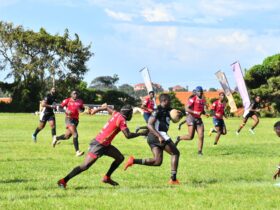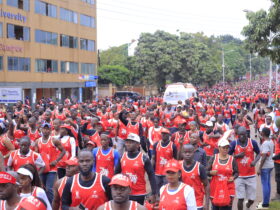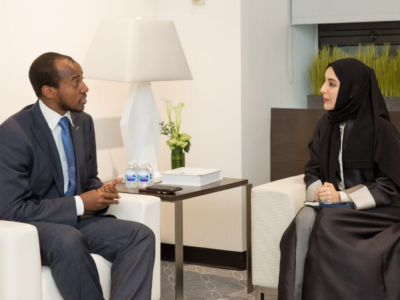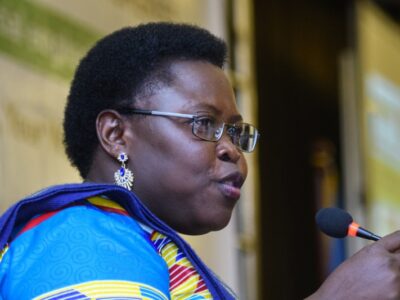The Health Ministry has received more than 20 million doses of Measles-Rubella (MR) vaccine, ahead of its nationwide campaign scheduled for September this year.
The vaccines worth $19m (about sh70b), were procured by UNICEF with support from Gavi. This will protect more than 18 million children aged nine months to 15 years against measles and rubella.
Dr. Charles Olaro, the Director of Clinical Services, received the consignment on behalf of the health ministry at Entebbe International Airport recently.
Olaro called upon the public to embrace the campaign saying the vaccines are free, safe and effective.
Measles is a highly contagious disease caused by a virus, which usually results in a high fever and rash, which can cause complications and lead to death.
Rubella is a mild viral infection. If an unimmunized pregnant women gets Rubella during her first trimester (first three months of pregnancy), this can cause abortion, stillbirth or a set of serious birth deformities known as Congenital Rubella Syndrome (CRS).
FACTS ABOUT MEASLES-RUBELLA DISEASE
What is Measles disease?
Measles is a highly infectious disease caused by a virus. The disease has no specific treatment but can be prevented by immunisation.
How is Measles spread?
Measles is an airborne disease and highly infectious. It is spread by inhaling air that is infected with the Measles virus. Measles affects all ages, but it is more frequent in children who are not
immunized
What are the signs and symptoms of Measles?
• Fever
• Generalized skin rash lasting a minimum of 3 days
• Red eyes
• Red lips and sores in the mouth
• Cough
• Runny nose
It is important to note that Measles is usually more severe in unimmunized children
What are the complications resulting from Measles?
• Severe weight loss
• Cough or rapid breathing (Pneumonia)
• Damage to the eyes which may cause blindness
• Pus discharge from the ears, which may lead to deafness
• Convulsions which may lead to brain damage
How is Measles prevented?
Immunization is the best way to prevent Measles. All children should be immunized against
Measles at 9 months during routine immunization. However, in a bid to prevent and control the
current Measles outbreak in the country, all children aged 9 months to under 15 years should be
immunized irrespective of their immunization status during the Measles-Rubella campaign.
What is Rubella Disease?
Rubella is a mild, yet highly contagious disease caused by a virus. The disease features as a red
rash and can cause birth defects or death of the unborn child of an infected pregnant woman.
How is Rubella transmitted?
Rubella is a viral disease and is mainly transmitted by coughs. Rubella can also be transmitted
through the placenta of a pregnant woman and affect the foetus (unborn baby).
What are the complications resulting from Rubella disease?
When a woman is infected with the Rubella virus early in pregnancy, she has a 90% chance of
passing the virus on to her unborn baby through the placenta. This can cause miscarriage,
stillbirth or severe birth defects known as Congenital Rubella Syndrome (CRS)
How is Rubella prevented?
Rubella can be prevented through immunization of all children aged 9 months to under 15 years during the Measles-Rubella immunization campaign and children at 9 months during routine immunization. This will give them protection against Measles and Rubella diseases. The best protection against Measles and Rubella is through immunization
How effective is the Measles-Rubella vaccine?
The Measles-Rubella vaccine is very effective in preventing Measles-Rubella diseases when all
the targeted children receive the recommended doses.
A disease like Small Pox was eradicated through immunization and now Polio has almost been
eradicated globally through immunization. Similarly, Measles-Rubella disease can be
eradicated through mass immunization campaigns and routine immunization.
What are the benefits of Measles-Rubella immunization?
• It strengthens a child’s ability to fight measles and rubella diseases and reduces the chances
of suffering from these diseases
• It prevents complications such as lameness, heart problems, hearing problems,
developmental delays and blindness among others in children
• It reduces the burden/costs on parents/caregivers and communities in terms of time
and money spent on treatment
• It contributes to a child’s proper growth and development
• It protects the entire community from childhood vaccine preventable diseases
• Every child that has been immunized with the Measles-Rubella vaccine will be protected from
Measles and Rubella diseases and their complications
• Measles-Rubella immunization makes children healthy and strong – this enables them to
perform better in class
Who are the people responsible for providing Measles-Rubella immunization services during the campaign?
Measles-Rubella immunization services will be provided by qualified health workers at health
facilities and designated immunization posts
How is the Measles-Rubella vaccine administered?
The Measles-Rubella vaccine is administered by injection on the upper left arm During the
Measles-Rubella campaign it will be given to all children between the age of 9 months to under
15years.
Where and when will the Measles-Rubella immunisation campaign take place?
The Measles-Rubella immunisation campaign will take place at health facilities, routine
outreaches and designated vaccination posts in all districts.
The Measles-Rubella immunisation campaign will be implemented from Wednesday 25th to Sunday 29th September 2019.












